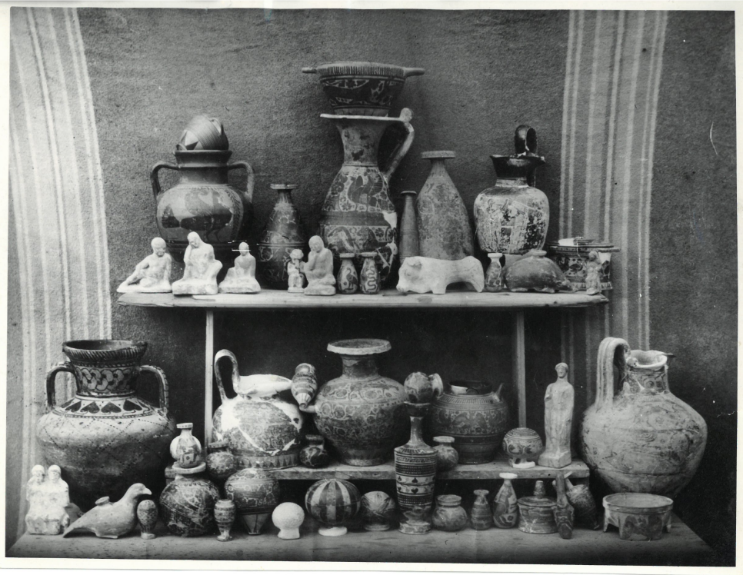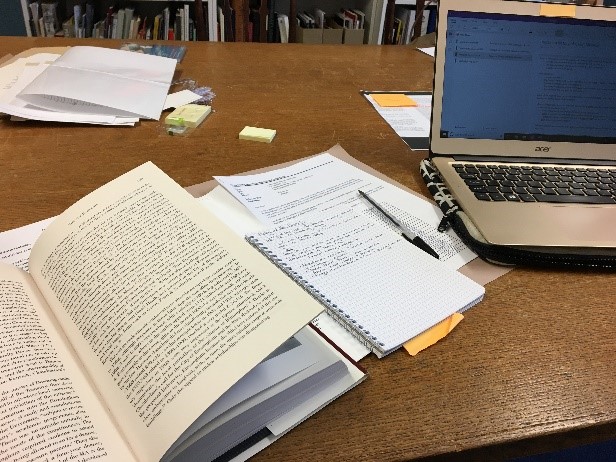by Kate Robertshaw
Throughout August and September, I had the pleasure of taking part in the Undergraduate Research Scholarship at the Archaeology Collection in the Department of Classics, Ancient History and Archaeology, with the guidance of Dr Maeve McHugh. The museum was first established in 1902 by Lecturer of Greek, Professor John Hopkinson, who first brought up the idea after buying a range of Greek vases on a trip to Rhodes. Since then, the museum has grown to house a variety of objects from throughout Greece, Rome, Egypt, and Mesopotamia.
Unlike written accounts which often give a biased opinion of a literate social elite, objects can tell us a lot about the everyday lives of ordinary people. Even the history behind how these objects were rediscovered and brought to museums can tell us a lot about the way artefacts are perceived and interpreted in modern culture.

A picture taken of Greek artefacts (some now on display in the Archaeology Museum) discovered at Rhodes in the early 1900s. (Department of Research and Cultural Collections).
This is why I have been documenting the many collections that make up CAHA’s Archaeology Collection to learn about the history behind these objects and how they came to be on display at the University of Birmingham. My aim has been to find out the original context of these artefacts and fill in the gaps of their history. This, in turn, helps us tell their stories with a more nuanced view of where they came from.
Professor Hopkinson’s vases from Rhodes proved to be the most intriguing because their exact archaeological origins were a mystery to all in the department. After extensive research and discussions with Dr Yannis Galanakis of the University of Cambridge and Dr Nicholas Salmon from the British School of Archaeology in Athens, we concluded that the artefacts were likely rediscovered during the great surge in archaeological activity at Rhodes by the Danish Archaeological Expedition in the early 20th century.
This was only one of the many different collections that this project covered and the information that we yielded has helped uncover a substantial history of these objects. For some, we were able to determine the date at which the artefacts were donated to the museum, while others we could trace back to particular collectors and records. Through this, we were able to determine the general context of a great many of these objects which greatly enhanced our overall understanding of their history and the museum’s development.

Initial research conducted at the Department of Research and Cultural Collections, reading up on the history of the University of Birmingham.
One of the best experiences I gained whilst on the research scholarship was the opportunity to explore these collections on a deeper level using resources such as the Cadbury Research Library and the British Museum. It has also taught me the importance of asking questions and how this can be helpful in exploring the directions that your research is taking you. Following up with other institutions which the collections were linked to also yielded. All this has been especially helpful in preparation for my final year dissertation as well as my pursuit for a career in museums and collections.

Working on the redisplay of the museum, which was taking place during the research scholarship, giving me the opportunity to help out with the collections.
The research scholarship has been such an enlightening experience and has taught me so much about the importance of collections and how their history can contribute to our own understanding of the ancient past. Many thanks to the organisers of the Undergraduate Research Scholarship for this opportunity as well as Dr McHugh and the rest at the Department of Research and Cultural Collections and the Cadbury Research Library for all the help over the course of the project.
If you would like to know more about CAHA’s Archaeology Collection and my experiences in the project, be sure to check out their podcast ‘Stories from Objects: the teaching collections of the Department of Classics, Ancient History and Archaeology, UoB’, with their first episode coming out in October!
